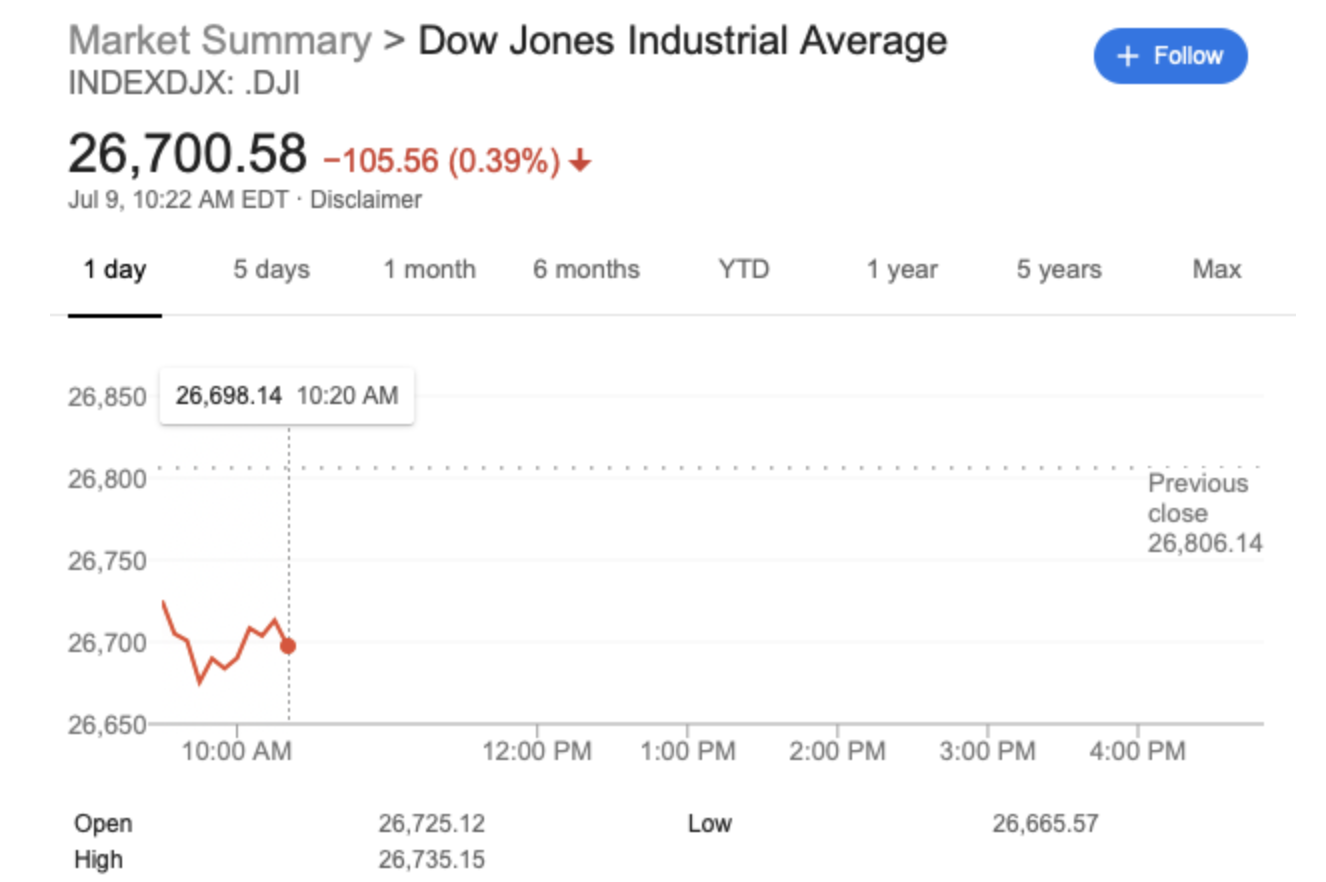The DOW had shed almost 100 points by 10:30am EST; and it’s hard to find the upside--even with a good chunk of Wall Street anticipating that the Fed could lower interest rate targets. For three days in a row, the DOW has lost 100 points before the opening.

(Click to enlarge)
Last week, the markets weren’t open as long because of the holiday, and the DOW, S&P and Nasdaq all enjoyed record closes Wednesday, but since then it’s been a major pullback.
So what gives? The economy, quite simply, and Wall Street has spoken.
Data for June showed a big jump in nonfarm payrolls, which meant that all the excitement about a potential rate reduction coming from the Fed fizzled out. In other words, while the market has been short-sightedly foaming at the mouth over a potential rate cut, a strong jobs report has slapped it in the face.
Friday’s jobs report should employment better than expected in the U.S.--and that’s exactly what would derail an interest rate cut, or at least delay one.
But it’s more than that. This is the era of extreme globalization, and there really is no such thing as an “American economy” anymore--at least as a separate beast.
So we look to Morgan Stanley.
Morgan Stanley strategist Andrew Sheets cut upside to the firm’s 12-month price targets to 1 percent for the S&P 500, MSCI Europe, MSCI Emerging Markets and Japan’s Topix.
The thing is, even if the Fed does lower interest rate targets, Sheets doesn’t see much upside because it could be offset by weaker growth anyway.
The Fed’s next policy meeting is at the end of this month, so from a market perspective, there’s a huge amount of time for this all to resonate--and change.
Related: Erdogan Fires Central Bank Head As Desperation Grows But as Patrik Lang, head of equity research at Julius Baer wrote in a note to clients carried by MarketWatch, “Our economists continue to expect a rate cut by the U.S. Federal Reserve at the end of July, but all eyes will now be on Fed Chairman Jerome Powell on Wednesday.”
“With regard to equities, any macroeconomic data that eases concerns about an impending slowdown, in combination with a Fed that is not tightening and a steepening yield curve, are, in our view, providing a bullish backdrop for equities in general, especially for cyclicals,” he said.
What happens on Wednesday? Clarity--or at least a hint of clarity.
Powell will start his two-day testimony before Congress, and during that time he will drop hints about the Fed’s end-of-month meeting to set interest rates.
Even though analysts widely expect a quarter-point reduction coming out of the July 30-31st meeting, no one’s terribly excited.
And in the run-up to tomorrow’s ‘clarity’ session, investors are wary of holding stocks.
Markets may have rallied in June, global trade and purchasing managers index data is worse, says Morgan Stanley’s Sheets.
“Global inflation expectations, commodity prices and long-end yields suggest little optimism about a growth recovery. On the back of the G20, our economists downgraded their global growth forecasts. We forecast an aggressive Fed and ECB action because we think growth concerns are material,” he wrote in a note to clients.
Related: How To Measure The Strength Of The Economy
And there’s one more big rethink Sheets suggests: When companies report their second-quarter earnings, they’re also likely to lower their full-year forecasts, and the market hasn’t necessarily priced in that risk. Morgan Stanley is pricing it in now because it’s Business Conditions Index took its biggest monthly hit--ever--in June.
Why should we listen to Morgan Stanley?
How about this: The firm plans to return a record $8.3 billion to shareholders over the next 12 months, according to Forbes. It’s hiking dividends by 17 percent beginning in Q3.
By Tom Kool for Safehaven.com
More Top Reads From Safehaven.com:
















